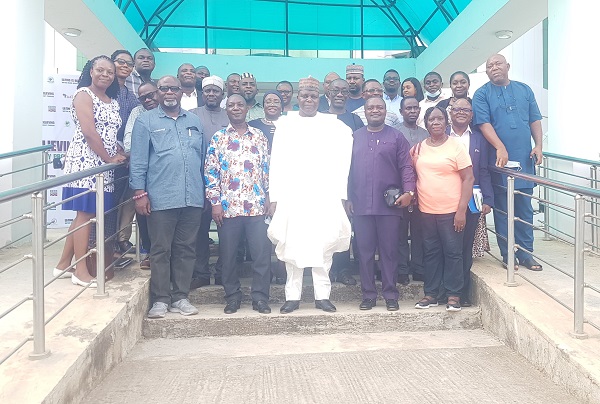
Sequel to Nigeria’s successful commercialisation of the Pod Borer Resistant (PBR) cowpea, the Bacillus Thuringiensis (Bt) Cotton and other products in the pipeline for commercialisation, a high-powered delegation of biotechnology/biosafety team members from Ghana has arrived Nigeria to understudy the nation’s success story.
Explaining the rationale for the visit during the team’s courtesy call facilitated by the African Agricultural Technology Foundation (AATF) to the National Biotechnology Development Agency (NABDA) today (April 4, 2022) in Abuja, the AATF representative for West Africa, Dr. Onyekachi Francis, said the team was in Nigeria to look at the biotechnology, biosafety infrastructure for deregulation and commercialisation of biotech products and wants to learn from Nigeria.
Onyekachi pointed out that Nigeria has a well-developed policy, regulatory system and instruments of commercialisation in place, seeing as Bt crops are in the hands of farmers.
“Africa is resourceful and can look inwards and develop her communities. Because of this policy, I also see prospects in developing our capacity to produce the food that we eat. The food we eat is very important and not something we need to depend on imports [for]. While some people are against the policies that enable us to produce what we eat, I still believe that every right-thinking African should focus on trying to see whatever they can do to domesticate science, technology and innovation (STI) to produce what we eat and consume what we produce.
“In line with this policy, the PBR cowpea is being through coordination/cooperation between researchers in Nigeria, Ghana and some other places to domesticate this science,” he added.
In his welcome remarks, the director-general of NABDA, Prof. Abdullahi Mustapha, who gave a run-down of the agency’s mandate and instruments for effective biosafety regulation, stressed the need for Africa to feed herself by relying on innovative technologies like biotech.
“We have to stand on our feet to see that we can feed our nation. We cannot rely on the importation of goods; we have to be on our feet to feed our nation. This is something we must do, there are no two ways about it and biotechnology is the answer to feed ourselves on the continent,” he emphasised.
He underscored the huge success recorded by Nigeria in the commercialisation of the PBR Cowpea, saying farmers waited anxiously for the improved seeds and overwhelmed the seed companies when it was released.
“We have testimonies from farmers in terms of wealth creation, yield, eradication of the pod-borer etc. Also, we have a programme that will encourage everyone that eating [the modified cowpea] is the only way to believe. We eat it to show people that all those fabricated lies against GMOs are not real,” he added.
In his remarks, the leader of the delegation and chairman, Parliamentary Select Committee on Ministry of Environment, Science, Technology and Innovation (MESTI), Parliament House, Accra, Ghana, Dr. Emmanuel Marfo, said the team has come to understand the importance of biotechnology application and how it can impact on the everyday lives of people.
The study tour, he stressed, will help the buy-in, not just only from colleague scientists, but from political class to understand the importance of science and technology to the development of Ghana.
“This helps us to expand our understanding of the things we need to do so that when it comes to oversight, we are better positioned to better provide the right oversight and lobby for budget,” he added.
In his comments, the chief executive officer, National Biosafety Authority (NBA), Ghana, Mr. Eric Okoree, pointed out that Ghana has already put the necessary system in place for the regulation of biotechnology. He said that country passed the Biosafety Act in 2011 and has an independent-minded board to regulate things.
He, however, pointed out that the adoption of the technology is based on sensitisation and how much it is understood. He added Ghana is keen on learning how Nigeria scaled the hurdle of public understanding of the technology.
In her remarks, the country coordinator, Open Forum on Agricultural Biotechnology (OFAB), Nigeria chapter, Dr. Rose Gidado, expressed delight at the collaboration and note-sharing between both countries. She harped on the need for Africa to learn from one another rather than always relying on developed countries to come to her aid to tackle her challenges, especially in food security.
Gidado expressed the hope that the study tour would be a good learning experience for both countries to facilitate food sufficiency, just as she reiterated the need for Africa to feed herself.


